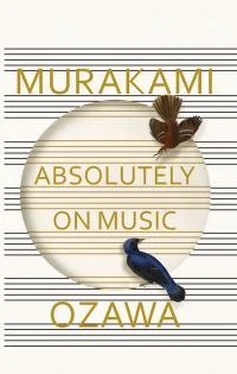OZAWA: Correct. And I reported my plans to Maestro Karajan. So when I was leaving as music director of the San Francisco Symphony to move to Boston, he suggested that I wait, and take a leave of absence to work with him. He would give me thorough training in the conducting of opera.
MURAKAMI: How kind of him!
OZAWA: Indeed. He seemed to think of me as one of his direct disciples. I was supposed to be resigning as director of the Ravinia Festival and taking over the Tanglewood Music Festival that summer, but I asked Boston to let me postpone for a year and spent the summer studying with Maestro Karajan instead. That was the Salzburg Don Giovanni I mentioned earlier, when I assisted him. He not only conducted the opera but he directed it, too. He even worked on the lighting himself.
MURAKAMI: Amazing.
OZAWA: He didn’t go so far as to do the costumes, of course, but the maestro was tremendously busy, so I got to do a lot of conducting in the rehearsals.
Mirella Freni’s Mimì
OZAWA: The title role was sung by Nicolai Ghiaurov, a bass from Bulgaria. Mirella Freni sang Zerlina. I accompanied their rehearsals on the piano almost every day. Before long, they were a couple and they ended up getting married in 1978. They were like family to me. [ Laughter. ] Afterward, I invited them to Tanglewood, and we did the Verdi Requiem. He appeared for me in Mussorgsky’s Boris Godunov and Tchaikovsky’s Eugene Onegin. Of course Mirella Freni sang Tatiana in Onegin. For years, we made it a habit to dine together after the opera. Unfortunately, Ghiaurov died in 2004.
MURAKAMI: So Freni could sing opera in Russian?
OZAWA: Yes, she often appeared in The Queen of Spades. Ghiaurov’s repertory included a lot of Russian operas, so she had to learn a lot of them, too, if they were going to work together as husband and wife. They were always together, on and off the stage.
MURAKAMI: So Freni made Russian opera one of her specialties.
OZAWA: Because I was lucky enough to meet her in Salzburg, I got to do a lot of different operas. We worked together on five or six of them, but the one she most wanted to do with me was La Bohème.
MURAKAMI: Singing Mimì. It’s one of her signature roles.
OZAWA: For years, she would say to me, “Let’s do La Bohème together next time, Seiji.” But for some reason, we never did it. I don’t know if I should be telling you this, but around that time, Carlos Kleiber brought La Scala to Japan and did La Bohème. I saw a performance and said to myself, “I could never do that. He’s just too good. There’s no hope for me. I could never top that.”
MURAKAMI: That was the 1981 Japan tour, wasn’t it? The tenor was Peter Dvorský.
OZAWA: And Mimì was Mirella Freni. I finally got to do La Bohème some years later, but by then Mirella was no longer singing. Now she’s back in her home town of Modena teaching voice. The timing just never worked out for us.
MURAKAMI: That’s really a shame.
OZAWA: Her Mimì was so beautiful, you’d never want to hear anyone else do it. You know how, in drama, an actor might appear as if he’s not acting at all? You ask him about it, and he’ll tell you, “It may not look it, but I’m out there acting as hard as I can.” As far as you can tell, though, as an observer, he’s barely working. He just seems to be there, naturally, entirely as is, no technique, nothing. Mirella’s Mimì was just like that.
MURAKAMI: La Bohème is an opera that won’t work unless Mimì makes the audience cry, don’t you think?
OZAWA: That’s quite true.
MURAKAMI: And Freni could do that naturally.
OZAWA: You can tell yourself, “I’m not going to cry today,” but you can’t help yourself. I’m thinking I’ll go visit her in Modena next time I’m in Florence.
He drinks hot tea.
OZAWA: This is sugar, isn’t it?
MURAKAMI: Yes, it is.
About Carlos Kleiber
MURAKAMI: Was Carlos Kleiber’s La Bohème really so wonderful?
OZAWA: You know, the conductor was totally enveloped in the play. All questions of technique had simply vanished somewhere. I asked him afterwards how he could manage to do such a thing, and he said, “Hey, Seiji, what are you talking about? I could conduct La Bohème in my sleep!”
MURAKAMI [ laughing ]: Amazing!
OZAWA: I had Vera with me at the time, so I wondered if he was showing off for her, but it’s true, he had been conducting La Bohème since his youth—enough times to be sick of it.
MURAKAMI: He had every last detail of it in his head, I suppose. But Kleiber had a rather limited repertory, didn’t he?
OZAWA: Yes, he didn’t have that many operas—or even symphonic pieces—in his repertory.
MURAKAMI: Funny, though, in a book I read recently, Riccardo Muti recalls a time when he was conducting Wagner’s Ring and Kleiber came to visit him backstage. They started talking, and Muti was astonished to realize that Kleiber had every last detail of The Ring engraved in his mind. He had never once performed The Ring, but he had studied the score with meticulous attention to detail.
OZAWA: Yes, Kleiber was a very studious conductor, and he knew his pieces well, but he could be a bit of a troublemaker. When he was conducting the Beethoven Fourth in Berlin, there was so much wrangling, they never knew from day to day whether he would actually go on. I knew him well and had an intimate view of the situation, but it appeared to me as though he was looking for an excuse to quit conducting the piece.
MURAKAMI: Have you ever cancelled an engagement?
OZAWA: Sure, with all my recent illness. But if I’m just running a little fever or something, I tend to tough it out and go on.
MURAKAMI: How about getting into a fight, to the point where you pack up and go home?
OZAWA: That happened just once. I think it was my second year as guest conductor with the Berlin Philharmonic. You know the Argentine composer Alberto Ginastera?
MURAKAMI: No, never heard of him.
OZAWA: Well, anyhow, I was conducting his 1941 composition Estancia, which is performed with a big orchestra. Maestro Karajan had chosen it for some reason, not to conduct it himself, but to have me study and perform it. I don’t know why, but I guess the orchestra was supposed to perform an Argentine piece. So I did what I had to do and studied it as hard as I could. I think the second part of the program was a Brahms symphony. I don’t remember which one. When I started rehearsing this Estancia, it turns out the percussion part is tremendously difficult. You need seven percussionists. Because it was so hard, I had only the percussionists rehearse their parts, letting the other musicians wait. But the rhythms were too complicated, and as we worked on it, we got bogged down completely. It was impossible. So then one of the percussionists, a young guy, laughed out loud. That made me furious, and I yelled at him, “What the hell is this? You’re laughing ?” But he just sat there without apologizing, and that made my blood boil. So I yelled again, “You’re supposed to be the great Berlin Philharmonic, aren’t you? What’s going to happen in two days when you’ve got to perform this thing?” That just made it even more impossible to play. I was so mad, I left the score there, yelled one word, “Break!” and got the hell out of the room.
MURAKAMI: Wow.
OZAWA: So then I called my manager, Ronald Wilford, in New York. I said, “I’m coming home. I can’t work in this place anymore. No way. I want you to apologize to Maestro Karajan for me.” Then I notified the orchestra managers that I was returning to America and went straight back to the Kempinski Hotel. In those days, though, Berlin was still divided between East and West, and there were no direct flights from West Berlin to New York. You had to transfer somewhere. So I had the hotel order a ticket for me and started packing.
Читать дальше











